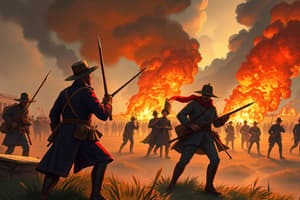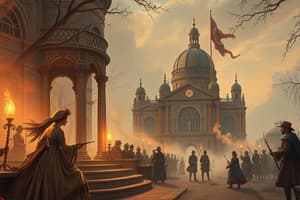Podcast
Questions and Answers
What happened at Fort Sumter?
What happened at Fort Sumter?
President Davis decided that the war should begin there.
What was the Anaconda Plan?
What was the Anaconda Plan?
It called for a three-part assault on the Confederacy.
What was the significance of the Battle of Bull Run?
What was the significance of the Battle of Bull Run?
It was the first battle of the war and resulted in a Confederate victory.
What was the significance of the Battle of Antietam?
What was the significance of the Battle of Antietam?
How did Stonewall Jackson earn his nickname?
How did Stonewall Jackson earn his nickname?
What was George McClellan criticized for?
What was George McClellan criticized for?
What nickname did Ulysses S. Grant earn?
What nickname did Ulysses S. Grant earn?
What lesson did the Battle of Shiloh teach both sides?
What lesson did the Battle of Shiloh teach both sides?
What was David G. Farragut known for?
What was David G. Farragut known for?
What was Robert E. Lee known for?
What was Robert E. Lee known for?
A writ of ________________ is a court order that requires authorities to appear before a judge and show cause for jailing a prisoner.
A writ of ________________ is a court order that requires authorities to appear before a judge and show cause for jailing a prisoner.
What is a Copperhead?
What is a Copperhead?
The riots that broke out among lower-class New York City workers in 1863 were in reaction to _____________
The riots that broke out among lower-class New York City workers in 1863 were in reaction to _____________
Early in the war, the Confederacy tried to gain support from the nation of _______
Early in the war, the Confederacy tried to gain support from the nation of _______
During the war, the _________ powers of the federal government were expanded.
During the war, the _________ powers of the federal government were expanded.
What happened at Chancellorsville?
What happened at Chancellorsville?
What was the impact of Stonewall Jackson's death?
What was the impact of Stonewall Jackson's death?
Why is the Battle of Gettysburg considered the turning point of the Civil War?
Why is the Battle of Gettysburg considered the turning point of the Civil War?
What was the Gettysburg Address?
What was the Gettysburg Address?
What did the fall of Vicksburg achieve?
What did the fall of Vicksburg achieve?
What was the significance of William Tecumseh Sherman's march?
What was the significance of William Tecumseh Sherman's march?
What role did George McClellan play in the 1864 election?
What role did George McClellan play in the 1864 election?
What was Ulysses S. Grant's strategy during the war?
What was Ulysses S. Grant's strategy during the war?
When did Robert E. Lee surrender?
When did Robert E. Lee surrender?
Where did the final surrender of the Confederate Army take place?
Where did the final surrender of the Confederate Army take place?
What did William Tecumseh Sherman do after the Civil War?
What did William Tecumseh Sherman do after the Civil War?
Which states did the Emancipation Proclamation free slaves in?
Which states did the Emancipation Proclamation free slaves in?
What was the National Bank Act of 1863?
What was the National Bank Act of 1863?
In 1881, Clara Barton helped found the American branch of the ________, an agency whose aim is to relieve human suffering.
In 1881, Clara Barton helped found the American branch of the ________, an agency whose aim is to relieve human suffering.
What did the 13th Amendment achieve?
What did the 13th Amendment achieve?
Flashcards
Fort Sumter
Fort Sumter
The first battle of the Civil War. Its bombardment marked the beginning of the war.
Anaconda Plan
Anaconda Plan
A Union strategy to defeat the Confederacy by blockading its ports, controlling the Mississippi River, and cutting off supplies.
Bull Run
Bull Run
The first major battle of the Civil War, where the Union was defeated by the Confederacy.
Antietam
Antietam
Signup and view all the flashcards
Stonewall Jackson
Stonewall Jackson
Signup and view all the flashcards
George McClellan
George McClellan
Signup and view all the flashcards
Ulysses S. Grant
Ulysses S. Grant
Signup and view all the flashcards
Shiloh
Shiloh
Signup and view all the flashcards
David G. Farragut
David G. Farragut
Signup and view all the flashcards
Robert E. Lee
Robert E. Lee
Signup and view all the flashcards
Habeas Corpus
Habeas Corpus
Signup and view all the flashcards
Copperhead
Copperhead
Signup and view all the flashcards
Draft Riots
Draft Riots
Signup and view all the flashcards
Chancellorsville
Chancellorsville
Signup and view all the flashcards
Loss of Stonewall Jackson
Loss of Stonewall Jackson
Signup and view all the flashcards
Gettysburg
Gettysburg
Signup and view all the flashcards
Gettysburg Address
Gettysburg Address
Signup and view all the flashcards
Vicksburg
Vicksburg
Signup and view all the flashcards
William Tecumseh Sherman
William Tecumseh Sherman
Signup and view all the flashcards
End of Civil War
End of Civil War
Signup and view all the flashcards
National Bank Act of 1863
National Bank Act of 1863
Signup and view all the flashcards
Red Cross
Red Cross
Signup and view all the flashcards
13th Amendment
13th Amendment
Signup and view all the flashcards
What was the Anaconda Plan?
What was the Anaconda Plan?
Signup and view all the flashcards
How did the loss of Stonewall Jackson affect the Confederacy?
How did the loss of Stonewall Jackson affect the Confederacy?
Signup and view all the flashcards
Who was Ulysses S. Grant and why was he important?
Who was Ulysses S. Grant and why was he important?
Signup and view all the flashcards
What were the Draft Riots?
What were the Draft Riots?
Signup and view all the flashcards
Why was the Battle of Gettysburg significant?
Why was the Battle of Gettysburg significant?
Signup and view all the flashcards
How did the Civil War affect the U.S. banking system?
How did the Civil War affect the U.S. banking system?
Signup and view all the flashcards
Study Notes
Key Battles and Figures
- Fort Sumter: The starting point of the Civil War where President Lincoln tried to resupply with food, but President Davis opted to initiate conflict.
- Anaconda Plan: A strategic three-pronged approach devised to defeat the Confederacy through blockades and territorial control.
- Bull Run: The first major battle of the war, marked by inexperienced troops and ended in a Confederate victory.
- Antietam: Known as the deadliest single-day battle in U.S. history.
- Stonewall Jackson: A Confederate general recognized for his ability to remain composed under pressure, earning him the nickname "Stonewall."
- George McClellan: Appointed to command the Army of the Potomac, known for his cautious nature and facing criticism from Lincoln.
Strategy and Leadership
- Ulysses S. Grant: Union general famed for his aggressive tactics and tenacity, leading the charge in Western Tennessee and earning the nickname "unconditional surrender."
- Shiloh: A brutal battle illustrating the need for better reconnaissance and fortification practices.
- David G. Farragut: An admiral who captured New Orleans, significantly aiding in the Union’s control of the Mississippi River.
- Robert E. Lee: Noted for his tactical brilliance, he successfully defended Richmond but faced significant losses at Antietam.
Political Context and Social Issues
- Habeas Corpus: A legal principle ensuring that a prisoner can be challenged in court.
- Copperhead: Northern Democrats advocating for peace with the Confederacy, showing divisions within the North.
- Draft Riots: Erupted in 1863 in New York City due to discontent with conscription laws, illustrating class tensions.
Major Events and Consequences
- Chancellorsville: A significant Confederate victory achieved by outmaneuvering Union General Hooker, showcasing Lee’s tactical skills.
- Loss of Stonewall Jackson: His accidental death dealt a severe blow to Confederate morale and strategy.
- Gettysburg: A pivotal three-day battle viewed as the turning point of the Civil War, crippling the Confederate army's ability to invade the North.
- Gettysburg Address: A speech by Lincoln honoring the fallen soldiers and reaffirming the principles of equality and democracy.
Conclusion of War
- Vicksburg: The fall of this city, along with Port Hudson, marked the Union's success in splitting the Confederacy.
- William Tecumseh Sherman: Notable for his destructive march through Georgia, aimed at demoralizing the South and disrupting supply lines.
- End of Civil War: Robert E. Lee surrendered at Appomattox Court House on April 9, 1865, signifying the war's conclusion.
Post-War Developments
- National Bank Act of 1863: Introduced reforms to stabilize the banking system and promote business safety.
- Red Cross: Founded by Clara Barton in 1881 to provide relief during human suffering and disasters.
- 13th Amendment: Abolished slavery throughout the United States, a critical milestone in American history.
Studying That Suits You
Use AI to generate personalized quizzes and flashcards to suit your learning preferences.




